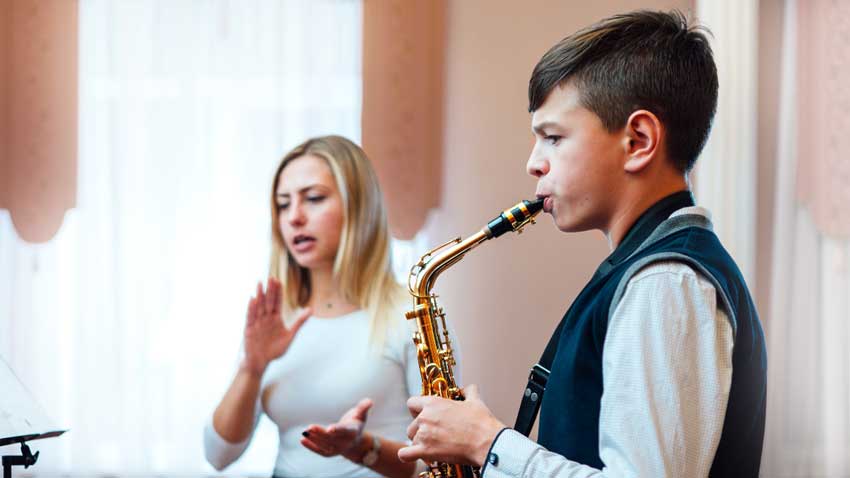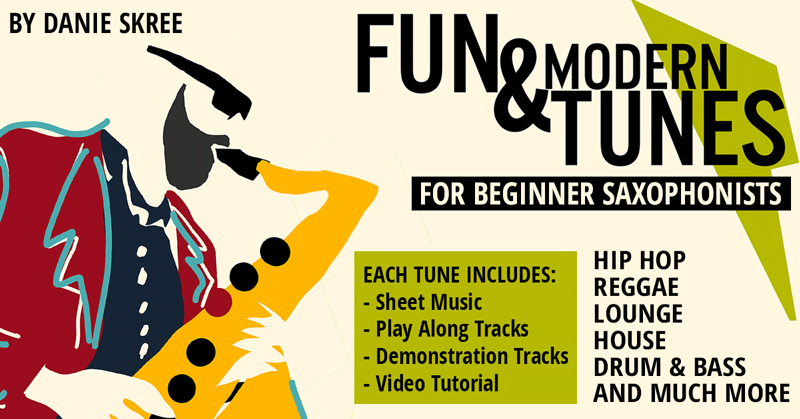20 Key Benefits of Studying with a Private Music Teacher

Introduction
Many students learn to play a musical instrument by enrolling in an elective beginning band class as part of the middle and high school music curriculum.
Instruction usually starts at the beginning of the 6th grade and students are taught in a group setting with all instruments combined into one class. These classes are usually taught by a band director who earned a music education degree from an accredited four-year university and received certification from the state to teach.
As part of their university musical training and certification, band directors are required to become proficient on one primary instrument and also take instrumental music method courses in woodwinds, brass, percussion, and strings where they are instructed on how to play and teach each instrument.
This sounds great, but unfortunately, band directors only learn the basic playing fundamentals in these method courses, just spending around three weeks on each instrument. It is extremely difficult to learn how to play and teach a musical instrument in three weeks. As a result, band directors are not adequately prepared as they begin teaching music students leading to poor instruction.
In addition, band classes are taught in a group setting, with little individualized instruction, making it difficult for playing mistakes to be discovered and corrected. Consequentially, many music students develop bad playing habits which impede progress, create frustration ,and could ultimately cause them to quit the program.
The Importance of Having a Private Applied Teacher
In order to resolve this issue, it is essential that instrumental music students find a private applied teacher who has the knowledge and skill to properly instruct them on how to play their chosen instrument through individualized lessons. A private applied teacher can be a great asset to students learning to play a musical instrument in many ways.
Listed below are twenty benefits of having a private applied teacher that can greatly enhance a student’s progress.
A qualified private applied teacher can assist the student in the following ways:
- Be a model for the student by demonstrating how things are to be performed correctly
- Suggest recordings and performers for the student to listen to and imitate
- Correct bad playing habits and problems through individualized instruction
- Provide the student with tone and technique strategies that will save time and increase the rate of progress
- Provide student with recommendations for method books, solos and selecting repertoire
- Make structured, logical, sequential playing assignments that will provide the student with direction and increase the rate of progress
- Design a structured practice routine so the student progresses in a logical, sequential manner
- Answer questions the student has about all aspects of performance
- Motivate, praise and encourage the student
- Make recommendations for appropriate equipment, mouthpieces, reeds
- Assist the student with a new instrument purchase by play testing the instrument and providing recommendations
- Assist with reed selection and adjustment
- Assist the student in making adaptations and adjustments to their instrument (palm key risers, etc.)
- Assist the student with instrument maintenance and check the instrument for problems
- Help the student get involved in performance opportunities outside the school program in local or community groups
- Offer the student alternate ways of performing passages (alternate fingerings, phrasing)
- Assist the student with preparation of music for performance in class, playing tests and concerts
- Assist the student in chair, honor band, all-state and university scholarship auditions
- For older students, provide information about booking gigs, travel and contracts
- Also for older students, provide information about upcoming teaching or playing positions and serve as a reference for school admissions or job applications
It can be seen from the benefits listed above that a private applied teacher is a great asset for the instrumental music student. These benefits become even more important if the student is a competitive player or planning to become a music teacher or professional musician.
Students that have a private applied teacher can be confident that they are playing their instrument correctly and know they have a resource person to rely on when issues arise as they continue their journey to becoming a better musician.






November 24, 2023 @ 8:02 pm
Nice article. One point of contestation. I went to a school called Towson State just north of Baltimore City. In my method classes we played the instruments for a semester. In WW Class because I already played sax and clarinet I did flute and oboe. In Brass Class I did trumpet for 2 semesters. For Upper strings we split our time between viola and violin. In Lower Stress we only did cello and touched the bass very briefly. In Perc Class we did snare first, learned how to bit the bass drum. Then 2nd semester we did Mallets. I actually taught 5th grade strings here in Va Bch, VA as a PT teacher for 2 yrs before my job was cut. At 1 point in another town I taught both band & string ensemble at an All-Girl Privte high school. At an adjudication the adjudicator called me up after my string group played. They did better then the band. SO the guy says to me “Mr. Weintraub your string group did better then your band. Are you a strings player yourself?” I told him, “the only thing I have in common w/strings is that both saxophone and strings start w/the letter “:S”.” I find that overall strings kids are more serious. A lot of band kids use band as a social group outlet. When I was in high school the girl I dated for a while was a flute player who sat across me when I was in the clarinet section. When I played alto sax I sat kind of behind her. Anyway nice article. I have several articles on this site too, just do a search of my name, Larry Weintraub. One of my best articles is about the time Michael Brecker did a 1 day Workshop at my Navy Band in Norfolk, VA.